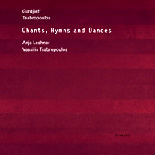Cellist Anja Lechner and pianist Vassilis Tsabropoulos team up for a fascinating traversal of several intermingling cultures at the crossroads of Europe and Asia, as seen through the eyes of one of the early 20th century’s most enigmatic figures: spiritualist (many would say fake fakir) Georges Ivanovitch Gurdjieff. Born at the border of Armenia and Turkey to a Greek family sometime in the late 1860s or early 1870s, Gurdjieff travelled to Moscow, St. Petersburg, Tbilisi, Istanbul, and Berlin, among other cities, before settling in Paris. Though far less known as a composer than as a mystic guru, Gurdjieff penned more than 200 works, 11 of which appear here in arrangements by Lechner and Tsabropoulos.
Three of Tsabropoulos’ own compositions (Trois morceaux après des hymnes byzantins, Dance, and Chant) also appear on this CD. The three movements of Trois morceaux all take their inspiration from hymns that are used to this day in the Greek Orthodox Church during Great Week (the week leading up to Easter Sunday). Much of the appeal of Byzantine chant lies in its sense of timelessness and the feeling of grandeur, facets that Tsabropoulos conveys quite nicely in his re-imaginings, save for some truly New-Agey piano noodling in the second movement that skirts dangerously toward the dark side of contemporary Hellenic music (Yanni, et al.). Tsabropoulos’ Dance, on the other hand, is a lively, bracing treat that serves as something of a palate-cleanser mid-disc, pitched between far more elegiac works.
This disc is most effective when Lechner and Tsabropoulos examine the geographic and emotional crossroads that Gurdjieff and Tsabropoulos share. In Gurdjieff’s Prayer, for example, Lechner’s cello intones a dark-hued chant over rolling piano figures that stand in for a Byzantine-style chorus. With evocative piece titles like Duduki (the name of Armenia’s beloved national instrument, a double-reeded wind instrument made of apricot wood), Assyrian Women Mourners, and Armenian Song, Gurdjieff gives voice to the land of his youth, a landscape that Tsabropoulos also knows well.
Whatever you might think about the rest of Gurdjieff’s lifework–and even Lechner and Tsabropoulos are quick to assert that their interest in him is purely musical–this is, by and large, a recording that is more than a novelty item and is greater than the sum of its parts. Gurdjieff’s works are by no means deep, and certainly there’s no reason to make an in-depth study or analysis of them, but all the same these pieces are quite elegant and beguiling, and the soloists offer sensitive, nuanced performances.
































